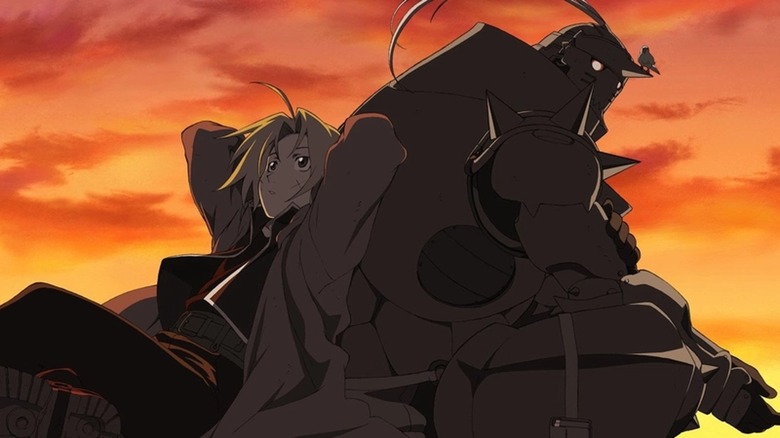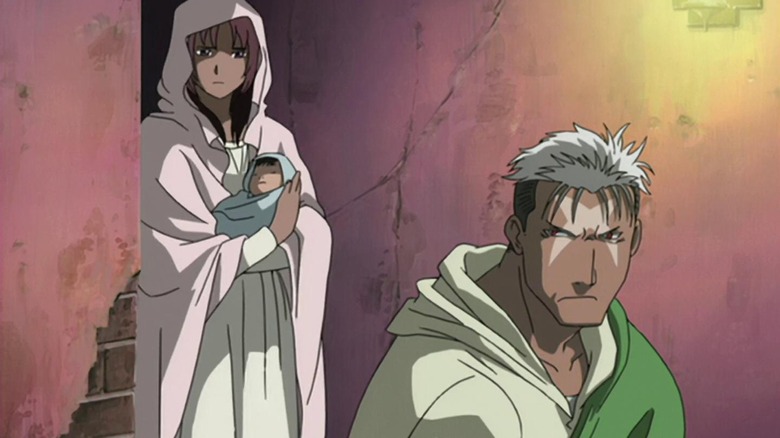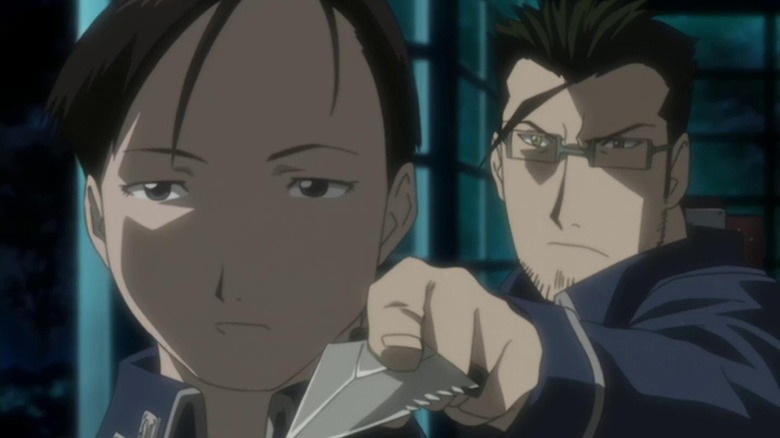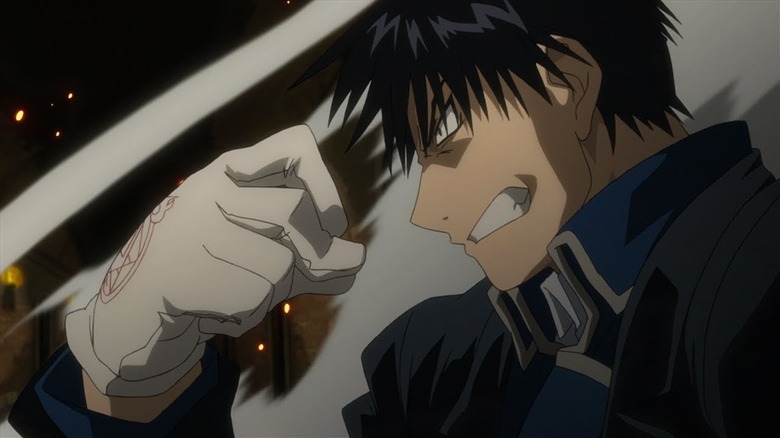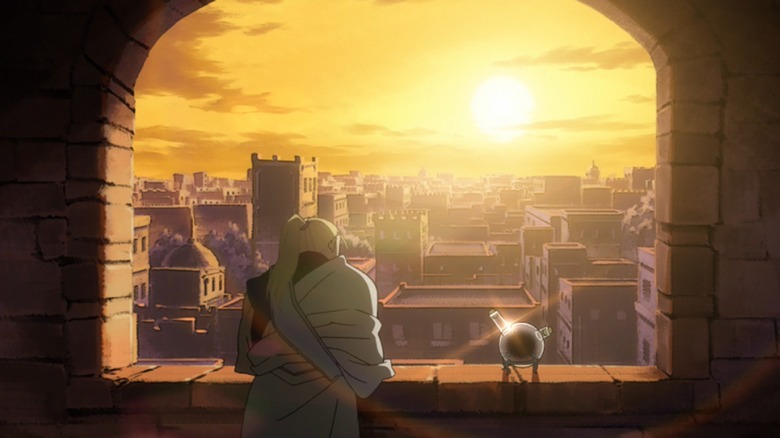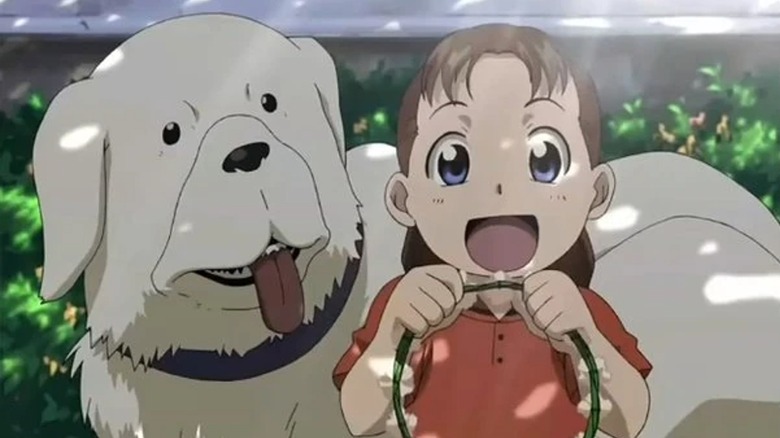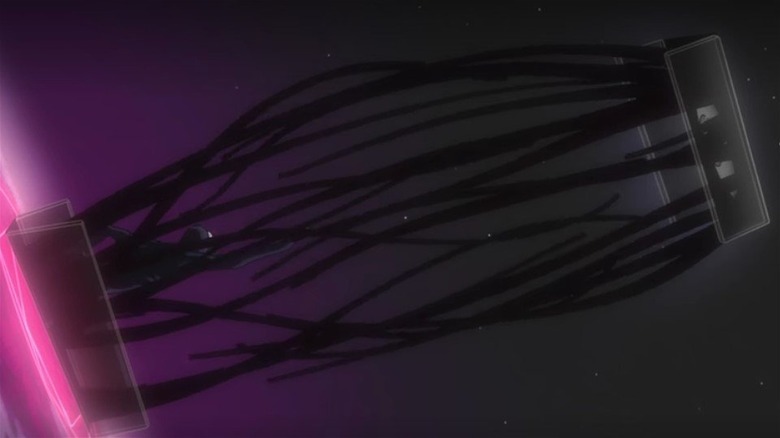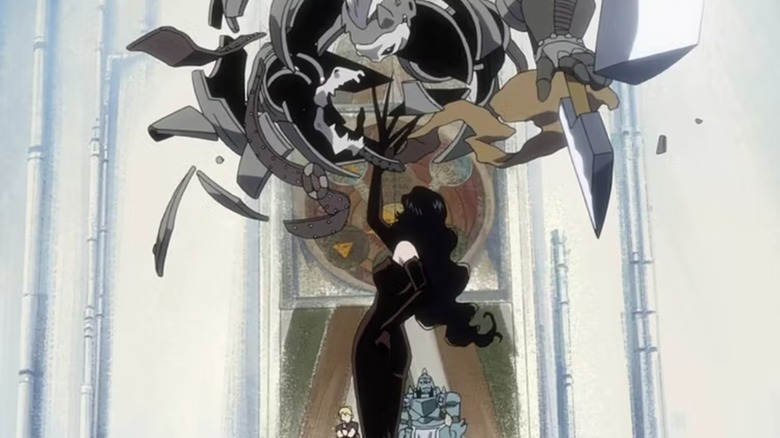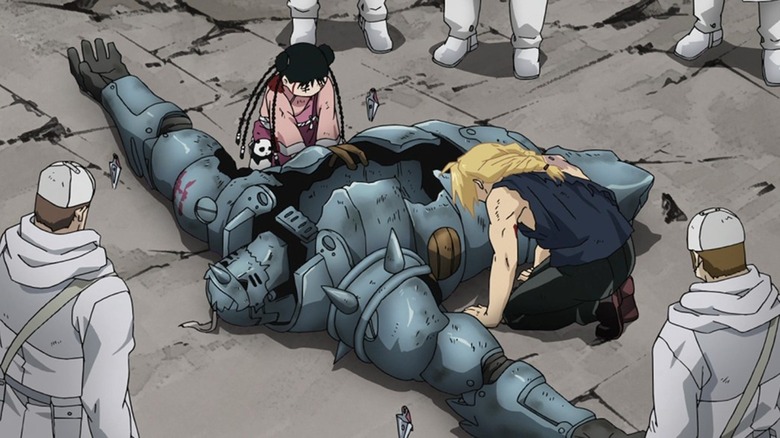The 8 Best Episodes Of Fullmetal Alchemist, Ranked
"A lesson without pain is meaningless. That's because no one can gain without sacrificing something. But by enduring that pain and overcoming it, he shall obtain a powerful, unmatched heart... a Fullmetal heart."
These words spoken by Edward Elric capture the soul of "Fullmetal Alchemist: Brotherhood," which is based on Hiromu Arakawa's manga series, "Fullmetal Alchemist." Perhaps one of the most life-affirming, transformative anime experiences to date, "FMA: Brotherhood" plunges us into the fictional country of Amestris, along with the mysterious, convoluted art of alchemy that constantly propels people towards the true cost of coveting something precious to them. 2009's "FMA: Brotherhood" isn't the only adaptation to exist, as an anime titled "Fullmetal Alchemist" was produced by Bones and helmed by Seiji Mizushima in 2003 (comprising 51 episodes), but the former is undoubtedly considered to be the better, more faithful version by fans of the franchise. There's still plenty to love about the original anime; however, for the purpose of this ranking, I will be banking mostly on "FMA: Brotherhood," while selecting some choice episodes from the 2003 version that stand out in terms of storytelling and artistic ingenuity.
The scope of Arakawa's manga series is massively dynamic, as it takes a microcosmic approach that gradually expands to construct a bigger picture, where the tale of the Elric brothers paves the path for us to comprehend the beating heart of Amestris. Edward's status as a State Alchemist offers us a glimpse into the socio-political aspect of the occupation and how deeply connected it is to political machinations, social status, and countrywide strife culminating in war. The pathos inherent in loss is also felt on an intimately personal level, whether it is through unconditional friendships or unconventional bonds that fester at a moment's notice, as the sea of emotions is ever-changing.
With these sentiments in mind, here's my ranking of some of the best episodes in both adaptations of "Fullmetal Alchemist."
8. FMA (2003): episode 40, The Scar
Scar's arc emerges as a complex, nuanced exploration of the anti-hero trope, as his brand of vicious justice does not adhere to traditional morality, yet his actions stem from unimaginable loss and disenfranchisement. Although 2003's "Fullmetal Alchemist" explores Scar in accordance with the manga — and "Brotherhood" improves upon some aspects and invests more depth — episode 40 is memorable for verbalizing the intricacies of his backstory on the screen for the first time. An Ishvalan survivor, Scar opens up to Edward after an alleyway fight and recounts the origins of the X-shaped scar on his forehead, and how one ritual of prohibited human transmutation led to devastating consequences.
Although the series roots us in the shoes of Edward, a State Alchemist, and offers us plenty of reasons to root for those adhering to this path, such as Roy Mustang and Riza Hawkeye, Scar's perspective exposes the extremes of militarism and state-sanctioned violence on marginalized communities. Scar has every reason to hate State Alchemists, as they are directly responsible for the suffering of his people, but his violent unpredictability and bloodlust hinges upon his raw hatred for the group, leaving little space for nuance or individual evaluation of intent or impulse. This does not make him any less of a tragic anti-hero, as he is doomed to carry the pain of the Ishvalan massacre in his heart, along with the loss of his brother.
Some finer details about Scar are distinctly different in this episode when compared to the 2009 "FMA". For instance, Scar's array on his arm is a fragmented portion of the Grand Arcanum Array, an ancient, forbidden form of alchemy native to Ishvalans containing the secrets to creating a Philosopher's Stone. In some ways, Scar's right arm is a fragment of the Stone, functional enough to decimate State Alchemists. In contrast, the manga and "Brotherhood" depict Scar with arrays on both arms, forming a complementary yet equal and opposite elemental tetrad.
7. FMA (2003): episode 25, Words of Farewell
Maes Hughes' death is devastating no matter which version of "Fullmetal Alchemist" you prefer, but the 2003 anime effectively twists the knife by dwelling on the emotional repercussions of his passing. "Words of Farewell" unravels the conspiracy surrounding Lab 5 and the involvement of the military in an Ishvalan attack, with Hughes pursuing leads and confiding in the Elric brothers about his suspicions. Some time later, he inspects records about the Ishval war, discovering a discrepancy about Douglas, but he is quickly attacked by Lust and Envy, where the latter assumes the form of Lt. Ross. Although Hughes is able to defend himself after being injured and senses Envy's deception, he hesitates once the homunculi assumes Grace's form, granting the perfect window for him to be shot.
The build-up to this tragedy packs more punch here, as the episode takes its time to relish in finer details about every character involved with the case, with Hughes walking through a metaphorical maze and stumbling upon a path he was never meant to take. As we spend ample amount of time with Hughes, and watch him bond with the others — especially Roy and Edward — the reactions to his death feel more hard-hitting, especially when Edward has to be physically restrained once he learns about his death. The feeling here is the same as in every version: a good man has died upon learning the ugly truth, and unfairly paid the price for daring to cling to his morality in a corrupt world. Nevertheless, "Words of Farewell" drives this sentiment into our hearts in an unforgettable, visceral manner.
6. Brotherhood (2009): episode 53, Flame of Vengeance
Listen, Colonel Roy Mustang can be vicious when he needs to be and will absolutely stand on business when someone valuable is taken away from him. The aftermath of Hughes' death leaves Roy in a state of anguished despair, but he ends up hatching a coup to expose and kill the person who took his friend's precious life while aiding Edward in defeating a horde of Mannequin Soldiers. The Flame Alchemist has always been competent and level-headed, but this episode allows us to glimpse Roy's righteous fury, and the way the lead-up to the scene unfolds is wildly good. Envy, being a homunculus who revels in human squabbles and misery, tries to rile up Roy while admitting that he murdered Hughes, but when he expresses skepticism, Envy morphs into Grace to prove his point.
This is when Roy's features morph due to vengeful rage, and his pursuit and subsequent fight with Envy is some of the best in the series, as this is the first time we see Roy shine both as an alchemist and a person bent on exacting justice, no matter how brutal it might end up being. Although Envy thinks transforming into his massive original form would intimidate Roy, the latter is quick to unleash blow after blow, boiling his eyes and setting his body aflame. The way Roy moves with uncompromising menace is reminiscent of how he killed Lust in episode 19 (more on that to come) and is a tremendously cool Roy Mustang moment tinged with dramatic bittersweetness.
The highlight of the fight with Envy is when he morphs into Hughes to rattle Roy (a trick that had led to Hughes' death, as killing someone who looks like a loved one is instinctively harrowing) — except, this pisses him off even more, and Roy torches him again without hesitation.
5. Brotherhood (2009): episode 40, The Dwarf in the Flask
Hohenheim. A name synonymous with tragedy, the deceptive nature of perception at face value, and how true selflessness is often when the act remains hidden from the world. "The Dwarf in the Flask" explores Hohenheim's backstory in vivid detail, from the creation of the first Homunculus to the birth of Father, and how Hohenheim came to be involved in this journey. The implication that the darkest aspects of alchemy are built upon the cruelest interpretations of equivalent exchange is driven home here after the Homunculus maneuvers events to turn itself and Hohenheim into living Philosopher's Stones. Hohenheim's arc is painful to witness, as his humanity is ripped away from him, leaving him no choice but to adopt an aura that would paint him as cold, heartless, and monstrous to anyone who didn't know his true heart.
Apart from revealing Hohenheim's true nature, the episode shapes our perspective of Father, and how dangerous and horrifying he is as an entity intent on reshaping the world that imbibes "perfect goodness." Any megalomaniacal definition of perfection is bound to be bone-chilling, but Father takes it one step further by adopting an absence of morality so lawless that even his children are not exempt from it. Humanity is but a stepping stone for him to ascend into his idea of godhood, and emotions hold little value to him, but what makes him so dangerous is his ability to manipulate those around him regardless of their intentions, intelligence, or caution.
Moreover, this episode recontextualizes our understanding of two key players in the game, and allows us to gauge the efforts that Al and Elric would have to invest in order to unravel the truth and the cost of experiencing something so life-changing.
4. Brotherhood (2009): episode 4, An Alchemist's Anguish
I profusely apologize for bringing up the most traumatic episode in the series, but we have to talk about "An Alchemist's Anguish." As painful as it is, the events help establish how serious the repercussions of unchecked ambitions can be, especially when one recklessly toys with the sanctity of human life. The cost of equivalent exchange that Al and Edward end up paying stems from tragic circumstances that push two kids to extremes, but the saga of Shou Tucker and his daughter Nina represents pure evil and the erosion of humanity when possessed by the need for power. Initially, Shou seems like a well-balanced individual, willing to divulge his methods for creating a chimera while the brothers bond with Nina and her dog, Alexander.
Although the 2003 version explores Nina's bond with the brothers in greater detail, "Brotherhood" does not need to do so to illustrate the horror of what befalls her, as her innocence is instinctively worth protecting. When they find out that Shou Tucker infused Nina with her dog to create a chimera, robbing both living beings of their humanity and choice, Edward and Al are horrified beyond measure, just like us. Should alchemy really be a standardized practice when innocents like Nina can be used as experimental fodder for ambition, and discarded while the creature still retains flickers of consciousness? This event, followed by the chimera's tragic death, scars Edward deeply, altering his perception of alchemy and redefining his priorities when it comes to regaining what he and Al have lost.
Every character, no matter how tragic their arcs are, had the luxury to make choices, be it for the sake of protecting others, exacting revenge, or destroying everything. But Nina never had a choice, and the helplessness induced in the brothers after her transmutation forces them to face the terrible truth of such a cruel world.
3. Brotherhood (2009): episode 60, Eye of Heaven, Gateway of Earth
Total hopelessness is what you feel as this episode progresses, as it is the culmination of every event that has occurred, leading to an inevitable battle that starts to feel unjustly imbalanced. Father has morphed into his final boss form, leaving no doubts that defeating him is akin to toppling divinity, while Pride squares off against Edward and Al in a vicious battle. Meanwhile, Scar faces off against Bradley, a reconstruction transmutation circle freshly tattooed on his arm, and these pockets of chaos unfold while the entirety of Amestris is at the mercy of dual gates that threaten the advent of something sinister.
This stunningly animated episode is as thrilling and engrossing as every entry in the anime's final act, but this particular arc cements the true nature of evil and allows some characters to step into the roles they're meant to play in the grander scheme. Horrifying divine (or monstrous?) ascension via ominous-looking sky gateway aside, the most interesting thread running through this entry is Scar and how he has to face off against Bradley, the incarnation of Wrath, while also learning to subdue (or leverage) his own rage-fueled impulsivity.
Of course, Scar has come a long way since we first saw him fight Edward, but his reconstruction array presents him as someone who no longer views alchemy as sacrilege, as he now acknowledges that it can also help create as well as destroy. Deconstruction and reconstructions are two halves of a whole, and the dual arrays on his arms allow Scar to finally taste the truth about alchemy, which is the comprehension of the bigger picture and the ability to maintain an equilibrium between opposing states or impulses.
2. Brotherhood (2009): episode 19, Death of the Undying
This early episode is so high up for one reason: Roy Mustang versus Lust, which is one of the first instances of our protagonists going up against a Homunculus without complete knowledge about their intentions, powers, or origins. Lust is the most compelling among the early Homunculi introduced to audiences, and her involvement in Hughes' death makes her a target of Roy's rage, leading to a confrontation that remains seared in my head to this day. Although Roy's fight with Envy solidifies his badassery, this is when we see his quirks shine for the first time, as he alternates between indulging in his dorkier, sillier tendencies and transforming into someone cruel and sadistic when he snaps his fingers with the intention to burn Lust to crisp.
The Central Alchemical Laboratory build-up is also great, with Al, Hawkeye, Jean, and Roy going separate ways and Al shielding Hawkeye with his body, willing to stand his ground to defend a friend. Al's sweetness has always been the most endearing aspect of "Fullmetal Alchemist," as his relationship with Edward is unconditionally loyal and pure, but this moment allows him to step up in his brother's absence.
Focusing back on Roy, he bursts into the scene with Havoc's lighter, transmuting with its aid and scorching Lust enough to rattle her. Although Lust appears confident at first, Roy's dogged determination instills fear in her eyes, as he vows to keep flaming her until it kills her for good. Lust's cries of enraged agony feel visceral, and the realization that her Philosopher's Stone has run out of power marks a turning point in the series, allowing Roy to disintegrate her to dust. Lust's final attempt to reach out with her sharp, sword-like limb before being brutally cut short is unforgettable. Great stuff.
1. Brotherhood (2009): episode 63, The Other Side of the Gateway
An epic Father versus Edward fight ends with the former panicking on the verge of defeat, leading to a last-minute attack on Greed to absorb his Philosopher's Stone. Although he succeeds, Greed weakens Father considerably, allowing Edward to defeat him for good, and the aftermath prompts a journey to the Gate of Truth, which emerges as one of the most philosophically dense concepts in the series that underlines the ethos of true equivalent exchange, which is rooted in selfless love and an unconditional sense of brotherhood. The reason Father is met with failure is explained by the Truth when he arrives at his own Gate: the Homunculus only coveted what belonged to others and never evolved as a living being. Everything he amassed was borrowed and snatched from others, and true balance is attained by the enormity of his fall and the despair that awaits him beyond.
Edward's willingness to give up his core identity as an alchemist in exchange for Al's precious life and soul is the essence of truth, as he realizes that such an intrinsic, DNA-level sacrifice is only fitting for him to help Al be happy again. This selflessness paves the path for rewards beyond his expectations, as he is surrounded by the ones he loves, having accomplished everything he had set out for, and more.
The sequences with the Gates inject a sense of metaphysical awe amid events that feel fairly grounded despite their larger-than-life flair and introduce a point of no return for Edward when he approaches the Truth in its purest form. This is one of the most satisfying episodes in "Brotherhood" as it helps cement that everyone's reason to keep fighting was not in vain and that there is a world that makes space for even those with a Fullmetal heart.
